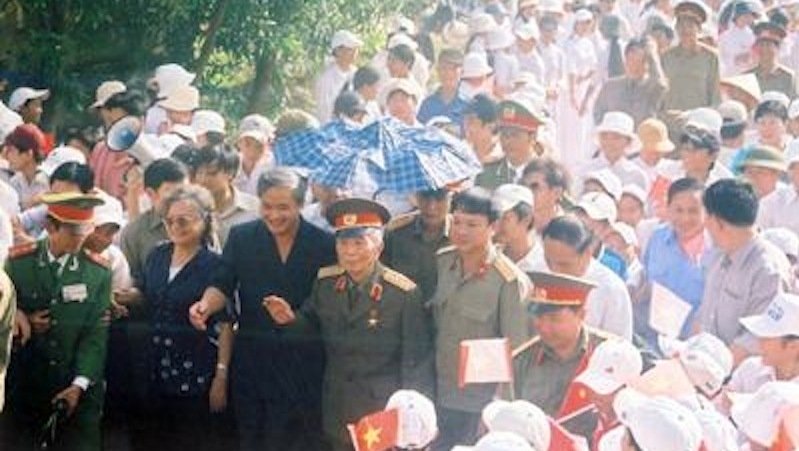General Vo Nguyen Giap and Vietnamese peasant class
ABO/NDO – While discussing General Vo Nguyen Giap, whether from a military, political, scientific or diplomatic perspective, we all admire a man with a sharp mind, bright morality and extraordinary stature.
The legacies that General Vo Nguyen Giap left for our people, army and national defense, have stood the test of time and have even more profound value and significance in today’s life.
In this article below, Vice President of the Vietnam Farmers’ Association Dinh Khac Dinh analyses the attachment between the legendary general and Vietnamese peasant class over the past century.
First, General Vo Nguyen Giap maintained a strong and deep attachment to the Vietnamese peasant class.
In 1937, General Vo Nguyen Giap and comrade Truong Chinh co-authored a book entitled ‘Van De Dan Cay’ (The Peasant Question), in which the authors studied the situation of rural Vietnam under colonial and feudal oppression. They also discussed the issue of land and peasants and highlighted the position of peasants in the Vietnamese revolution.
 |
| Locals in An Xa village, Loc Thuy commune, Le Thuy district, Quang Binh province warmly welcome General Vo Nguyen Giap during his visit to the homeland in 2004. (Photo: baoquangbinh.vn). |
What happened during the August Revolution and the two national resistance wars against the French and the US in the past as well as during the country’s Doi Moi (Renewal) and international integration period over the past 30 years, have proven the theoretical points mentioned by General Vo Nguyen Giap and comrade Truong Chinh in the book.
Second, General Giap is like a family member in the hearts of Vietnamese farmers.
Throughout his 103-year-life, General Vo Nguyen Giap made brilliant feats of arms and victories, which contributed to gaining liberation reunification to the nation and freedom to the people, including the peasants.
In his memoirs, late Senior Lieutenant General Tran Van Tra (1918-1996) wrote that Brother Van (the intimate nickname of General Vo Nguyen Giap) won the absolute respect of soldiers. He hailed General Giap as the Commander of Commanders and the Commander-in-Chief who shared the pain of every soldier's wound and mourned over every soldiers’ sacrifice.
His close attachment to the soldiers have placed the General in an important place in the hearts of his comrades and those of the Vietnamese farmers. Therefore, the passing of the General on October 4, 2013 led to deep mourning amongst the Vietnamese people and farmers in particular.
Third, General Vo Nguyen Giap had vision and scientific thinking on the sustainable development of agriculture, forestry and fisheries.
While serving as Deputy Prime Minister or Chairman of the State Committee on Science, General Giap mapped out strategic directions on developing the marine economy and sea-based tourism, applying science and technology in agriculture, and protecting the environment.
Fourth, General Vo Nguyen Giap successfully realised the military art of a people's war by mobilising farmers to fight as soldiers in the struggle for national liberation.
With the vision of an outstanding politician and diligent military talent, General Vo Nguyen Giap not only set up, trained and led an army grouping of farmers-soldiers but also succeeded in mobilising people, and farmers in particular, to join the revolutionary army.
According to him, the military arts of people's war is a war for the people and by the people. It is the war for the people because it serves the people’s goals such as independence and reunification for the nation and happiness for everyone. It is the war by the people because it is carried out by an army with people from all walks of life.
Fifth, General Giap's attachment to the farmers went beyond the relationship between a leader and people but it illustrates the Party and Uncle Ho’s guidelines on caring for the material and spiritual life of the farmers.
As part of his visit to homeland in Quang Binh province in 1990, General Giap worked and talked with officials of the provincial Farmers' Association, during which he urged the association to make more efforts to reduce poverty and improve local farmers’ livelihoods.
He also stressed the need to boost the application of science and technology in production in order to increase productivity.
Sixth, throughout his life, General Vo Nguyen Giap maintained the discipline of revolutionary cadres and left many valuable lessons for rural building.
To conclude, there are many touching and meaningful stories about General Vo Nguyen Giap’s attachment to Vietnamese farmers, which all assert that the General lives forever in the hearts of farmers and the peasant class in Vietnam.
(Source: NDO)
 về đầu trang
về đầu trang







